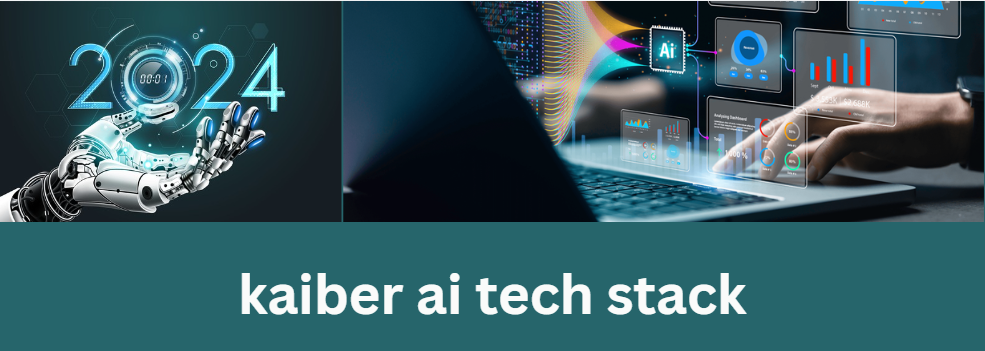In the rapidly evolving world of technology, artificial intelligence (AI) has become a transformative force across sectors. The integration of AI into real-world applications has provided businesses with unprecedented capabilities to optimize operations, streamline processes, and enhance customer experiences. One company leading the charge in this space is Kaiber AI, whose sophisticated tech stack is paving the way for cutting-edge solutions across industries.
This article will explore the Kaiber AI tech stack, a comprehensive and robust suite of AI tools designed to address challenges in customer service, supply chain management, and data analytics. We’ll go beyond just summarizing the technology by offering in-depth insights into how this AI stack is reshaping business operations, the key components that make it unique, and why it stands out in a crowded AI landscape.
Additionally, we’ll answer some frequently asked questions (FAQs) to clarify common queries about the Kaiber AI tech stack and its applications.
Contents
What is Kaiber AI?
Kaiber AI is an innovative AI-driven platform that focuses on delivering real-world solutions to businesses across different industries. It combines state-of-the-art machine learning, natural language processing (NLP), computer vision, and data analytics to provide actionable insights and intelligent automation.
Kaiber AI’s tech stack is designed to handle complex tasks like automating customer service interactions, predicting supply chain disruptions, and processing large datasets for real-time decision-making. It excels in creating AI-driven systems that can integrate seamlessly with existing IT infrastructures, offering businesses a scalable and flexible solution to modern challenges.
The Evolution of AI and Its Role in Business
Before diving into the specifics of the Kaiber AI tech stack, it’s important to understand the broader context of AI’s role in modern business. Over the past few decades, AI has progressed from a theoretical concept to a practical tool that is now indispensable in many industries.
From customer service chatbots to predictive maintenance in manufacturing, AI is transforming how businesses operate. The rise of machine learning (ML), deep learning, and data-driven AI has enabled companies to make more informed decisions, automate repetitive tasks, and deliver more personalized customer experiences. Kaiber AI’s tech stack taps into these capabilities, focusing on practical, scalable solutions that meet the evolving needs of businesses.
Key Components of the Kaiber AI Tech Stack

The Kaiber AI tech stack is built around several core technologies, each of which plays a crucial role in delivering comprehensive AI-driven solutions. Let’s break down the major components that make Kaiber AI’s technology unique and effective.
1. Machine Learning and Deep Learning
At the heart of Kaiber AI’s tech stack is machine learning (ML) and deep learning. These technologies allow Kaiber to build systems that can learn from data, adapt to new situations, and make accurate predictions.
- Supervised Learning: Kaiber AI uses supervised learning models to train its algorithms on labeled datasets. This approach is particularly useful in customer service applications, where the AI can be trained to recognize and respond to different types of queries.
- Unsupervised Learning: For more complex tasks like supply chain optimization, Kaiber relies on unsupervised learning. These algorithms can identify patterns and anomalies in large datasets without the need for labeled examples.
- Deep Learning: Kaiber AI incorporates deep learning techniques, especially in areas like natural language processing (NLP) and computer vision. This allows the AI to understand and process human language, as well as recognize visual patterns, making it ideal for real-time applications like sentiment analysis and image recognition.
2. Natural Language Processing (NLP)
Natural Language Processing (NLP) is another cornerstone of the Kaiber AI tech stack. NLP allows Kaiber AI to understand and interact with human language, making it an ideal tool for applications such as customer support, content generation, and sentiment analysis.
- Chatbots and Virtual Assistants: Kaiber AI uses advanced NLP models to power chatbots that can handle complex customer inquiries, providing real-time support. These AI-driven bots are capable of holding human-like conversations and understanding context, improving customer satisfaction while reducing operational costs.
- Sentiment Analysis: Kaiber’s NLP capabilities also extend to sentiment analysis, enabling businesses to gauge customer feedback, product reviews, and social media interactions. This data can be used to improve customer service strategies and product offerings.
3. Computer Vision
Computer vision is an integral part of the Kaiber AI tech stack, allowing the AI to process and interpret visual data. This is especially important in sectors like manufacturing, retail, and logistics, where image recognition can enhance operations.
- Inventory Management: Kaiber’s computer vision technology can be used to monitor stock levels in real time, ensuring that inventory is managed efficiently. By processing images from cameras or drones, Kaiber AI can detect shortages or surpluses and automate restocking processes.
- Quality Control: In manufacturing, Kaiber AI’s computer vision systems can automatically detect defects in products, ensuring quality control is maintained without the need for manual inspections.
4. Data Analytics and Predictive Modeling
One of the most powerful components of the Kaiber AI tech stack is its data analytics and predictive modeling capabilities. This allows businesses to make data-driven decisions and anticipate future trends.
- Predictive Maintenance: In industries like manufacturing, Kaiber AI can predict when machines are likely to fail based on historical data, enabling businesses to perform maintenance before breakdowns occur. This helps reduce downtime and extend the lifespan of equipment.
- Supply Chain Optimization: Kaiber’s predictive models can also be applied to supply chain management. By analyzing trends and historical data, Kaiber AI can forecast disruptions, optimize inventory levels, and suggest the best shipping routes, ensuring that the supply chain runs smoothly.
5. Scalability and Integration
One of the key advantages of the Kaiber AI tech stack is its scalability. The AI platform is designed to grow with your business, adapting to new challenges and increasing demands. Whether you are a small startup or a large enterprise, Kaiber AI offers flexible solutions that can be tailored to your specific needs.
- Seamless Integration: Kaiber AI can be integrated with existing IT infrastructures, CRM systems, and other third-party applications. This allows businesses to implement AI without the need for costly overhauls of their technology stack.
- Cloud-Based Solutions: Kaiber’s AI services are hosted on the cloud, making them accessible from anywhere and ensuring they are easily scalable. Cloud-based AI offers flexibility and reduces the need for on-premise hardware, further reducing operational costs.
Kaiber AI Tech Stack Applications Across Industries
The Kaiber AI tech stack is designed to address a wide range of challenges across multiple sectors. Let’s take a closer look at how this AI-driven platform is being used in real-world applications:
1. Customer Service
One of the most common uses of the Kaiber AI tech stack is in customer service. The platform’s advanced NLP models allow it to power AI-driven chatbots and virtual assistants that can handle a wide range of customer queries, from basic questions to complex troubleshooting.
- 24/7 Availability: Kaiber’s AI-powered virtual assistants can provide customer support around the clock, reducing the need for large customer service teams while still ensuring timely responses.
- Multi-Language Support: Kaiber’s NLP models are multilingual, meaning they can support customers in various languages, expanding the reach of businesses and improving customer satisfaction across global markets.
2. Supply Chain Management
In supply chain management, Kaiber AI’s predictive modeling and data analytics capabilities are invaluable. The platform can analyze large datasets to identify trends, predict disruptions, and optimize logistics.
- Real-Time Tracking: Kaiber AI enables real-time tracking of shipments and inventory levels, ensuring that businesses can respond quickly to changes in demand or potential disruptions.
- Predictive Analytics: By using historical data and real-time inputs, Kaiber’s AI can predict supply chain bottlenecks, allowing businesses to take proactive steps to mitigate potential issues before they occur.
3. Data Analytics and Business Intelligence
Kaiber AI’s data analytics capabilities go beyond simple data processing. The platform provides actionable insights that can drive strategic decisions across the business.
- Market Analysis: Kaiber AI can help businesses conduct market analysis by processing large volumes of data and identifying trends that may not be immediately apparent through traditional methods.
- Customer Insights: By analyzing customer data, Kaiber AI can help businesses personalize their marketing efforts, enhance the customer experience, and increase conversion rates.
4. Manufacturing
In the manufacturing sector, Kaiber AI’s combination of computer vision and predictive maintenance is helping companies improve quality control and reduce operational costs.
- Defect Detection: Kaiber’s AI-powered computer vision systems can detect defects in products on the assembly line, ensuring that only high-quality goods are shipped to customers.
- Predictive Maintenance: By using predictive analytics, Kaiber AI can forecast when machinery is likely to require maintenance, reducing downtime and avoiding costly repairs.
5. Retail
In retail, Kaiber AI’s tech stack is used to optimize inventory management, enhance the customer experience, and improve supply chain efficiency.
- Personalized Shopping Experiences: Kaiber’s NLP models enable retailers to create personalized shopping experiences by analyzing customer data and predicting buying behavior.
- Inventory Optimization: Kaiber’s computer vision technology allows retailers to monitor stock levels in real time, ensuring that shelves are always fully stocked and that inventory levels are optimized.
Benefits of the Kaiber AI Tech Stack
The Kaiber AI tech stack offers several benefits to businesses looking to integrate AI into their operations:
- Cost Efficiency: By automating repetitive tasks, Kaiber AI reduces operational costs and allows businesses to focus on more strategic activities.
- Scalability: The platform is highly scalable, making it suitable for businesses of all sizes. As your business grows, Kaiber AI can adapt to meet your evolving needs.
- Real-Time Insights: With its data analytics and predictive modeling capabilities, Kaiber AI provides businesses with real-time insights that can drive decision-making and improve operational efficiency.
- Improved Customer Experience: Kaiber AI’s NLP-driven chatbots and virtual assistants improve customer satisfaction by providing instant, accurate responses to inquiries.
FAQs about Kaiber AI Tech Stack
1. What is the Kaiber AI tech stack?
The Kaiber AI tech stack is a suite of AI tools that include machine learning, natural language processing, computer vision, and data analytics. It is designed to address real-world challenges in sectors like customer service, supply chain management, and data analytics.
2. What industries use Kaiber AI?
Kaiber AI is used across multiple industries, including retail, manufacturing, logistics, and customer service. Its flexible and scalable solutions can be adapted to a wide range of applications.
3. How does Kaiber AI improve customer service?
Kaiber AI improves customer service through its advanced natural language processing (NLP) models, which power AI-driven chatbots and virtual assistants. These tools can handle a wide range of customer queries in real time, reducing the need for large customer service teams.
4. Can Kaiber AI integrate with existing systems?
Yes, Kaiber AI is designed to integrate seamlessly with existing IT infrastructures, CRM systems, and other third-party applications. This makes it easy for businesses to implement AI without overhauling their entire tech stack.
5. Is Kaiber AI scalable?
Yes, the Kaiber AI tech stack is highly scalable, making it suitable for businesses of all sizes. The platform can adapt to growing demands and evolving business needs.
Conclusion
The Kaiber AI tech stack is a powerful and flexible AI-driven platform that offers real-world solutions across a wide range of industries. With its advanced machine learning, natural language processing, computer vision, and data analytics capabilities, Kaiber AI is helping businesses automate processes, improve customer experiences, and make data-driven decisions.
As AI continues to evolve, the Kaiber AI tech stack will remain at the forefront of innovation, providing businesses with the tools they need to stay competitive in an increasingly digital world. Whether you’re looking to optimize your supply chain, improve customer service, or gain deeper insights into your data, Kaiber AI offers a scalable and comprehensive solution tailored to meet your needs.



